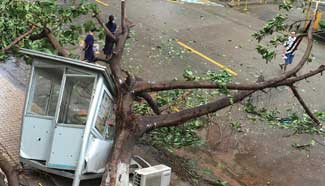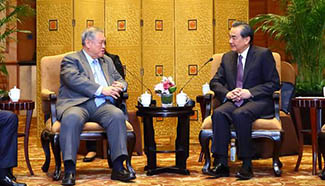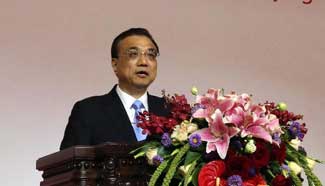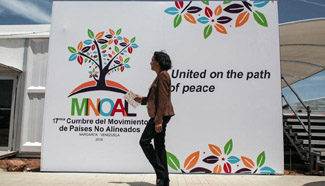VIENTIANE, Sept. 15 (Xinhua) -- Shared and sustainable benefits for local communities, investors and nations are the opportunities presented by greater connectivity and raised economic engagement between Southeast Asia, China and the wider region and the world, the head of a leading economic body said in Laos on Thursday.
Director General of the National Economic Research Institute of Laos Leeber Leebouapao said his country is in a position to benefit from the innovative, open, interconnected and inclusive approaches proposed by Chinese President Xi Jinping in his blueprint for developing the world economy in a speech at the B20 (Business 20) held ahead of the successful G20 summit in Hangzhou.
The approaches illustrate a "Chinese wisdom" of working harmoniously with cooperation and concerted efforts for a win-win end to achieve robust, sustainable, balanced and inclusive growth, Leeber said.
The analysis comes as Lao Deputy Prime Minister Sonexay Siphandone was quoted by Lao News Agency KPL as calling for ever closer alignment between China's Belt and Road Initiative and Laos' stated goals of leveraging its strategic location as a gateway to ASEAN in a transition from "landlocked to land-linked" during the China-ASEAN Expo that concluded Wednesday in China's Nanning city.
Speaking exclusively to Xinhua in Vientiane, Leeber identified physical transport infrastructure as well as trade facilitation as necessary to achieve increased potential for reciprocal trade and investment relations between neighbors China and Laos, which would serve as a gateway to the ASEAN region.
Better connectivity could link the untapped potential for value added production in Laos to bigger markets, as well as bringing in tourists that will spur essential demand for local goods and services, Leeber said.
"These four points and proposals are very important, as we can see in the context of more and more regional and global integration and cooperation the myriad benefits to be achieved between national, regional and global economies. This is particularly the case with Laos as a landlocked country," he said.
A key example of this approach was the Laos-China Railway on which ground was broken in Vientiane in December 2015 and whose December construction was announced in state-run media Vientiane Times Thursday, he said.
However, as a developing country with a small population, Leeber said Laos would continue to require external financial sources of foreign direct investment and overseas development aid to fully develop to its potential.
Leeber recommended partners assist in securing favorable financial terms in order to expedite the country's economic development and achievement of metrics for graduation from least developed country status by 2020, towards upper middle income status by 2030.
He also cited as important the Lao government's improvement in managing the country's natural resources, including forests as a necessary step for the sustainable development, taking into account social and environmental as well as economic imperatives in line with the UN's Sustainable Development Goals and the government's own 8th National Socio-Economic Development Plan (NSEDP) for 2016-2020.
Leeber's analysis on economic prospects in Laos comes following an intense period of regional engagement by the country during its 2016 chairmanship of the Association of Southeast Asian Nations (ASEAN), culminating in hosting ASEAN summits, the East Asia summit and the ASEAN-China summit to commemorate the 25th anniversary of the their dialogue relations last week in the capital of Laos.











